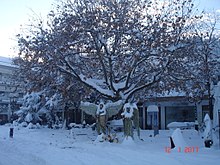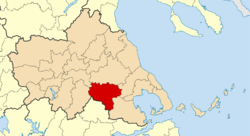Our website is made possible by displaying online advertisements to our visitors.
Please consider supporting us by disabling your ad blocker.
Farsala
Farsala
Φάρσαλος | |
|---|---|
 View of Farsala from the Ancient Pharsalus Acropolis | |
| Coordinates: 39°18′N 22°23′E / 39.300°N 22.383°E | |
| Country | Greece |
| Administrative region | Thessaly |
| Regional unit | Larissa |
| Area | |
• Municipality | 739.7 km2 (285.6 sq mi) |
| • Municipal unit | 121.433 km2 (46.886 sq mi) |
| • Community | 57.928 km2 (22.366 sq mi) |
| Elevation | 160 m (520 ft) |
| Population (2021)[1] | |
• Municipality | 16,341 |
| • Density | 22/km2 (57/sq mi) |
| • Municipal unit | 9,520 |
| • Municipal unit density | 78/km2 (200/sq mi) |
| • Community | 9,027 |
| • Community density | 160/km2 (400/sq mi) |
| Time zone | UTC+2 (EET) |
| • Summer (DST) | UTC+3 (EEST) |
| Postal code | 403 00 |
| Area code(s) | 24910 |
| Vehicle registration | ΡΙ |
| Website | www.farsala.gr |


Farsala (Greek: Φάρσαλα), known in Antiquity as Pharsalos (Ancient Greek: Φάρσαλος, Latin: Pharsālus), is a city in southern Thessaly, in Greece. Farsala is located in the southern part of Larissa regional unit, and is one of its largest towns. Farsala is an economic and agricultural centre of the region. Cotton and livestock are the main agricultural products, and many inhabitants are employed in the production of textile. The area is mostly famous for being the birthplace of the mythical ancient Greek hero Achilles, and the site of a major battle between Roman generals Gaius Julius Caesar and Gnaeus Pompeius Magnus in 48 BC.
- ^ "Αποτελέσματα Απογραφής Πληθυσμού - Κατοικιών 2021, Μόνιμος Πληθυσμός κατά οικισμό" [Results of the 2021 Population - Housing Census, Permanent population by settlement] (in Greek). Hellenic Statistical Authority. 29 March 2024.
Previous Page Next Page




